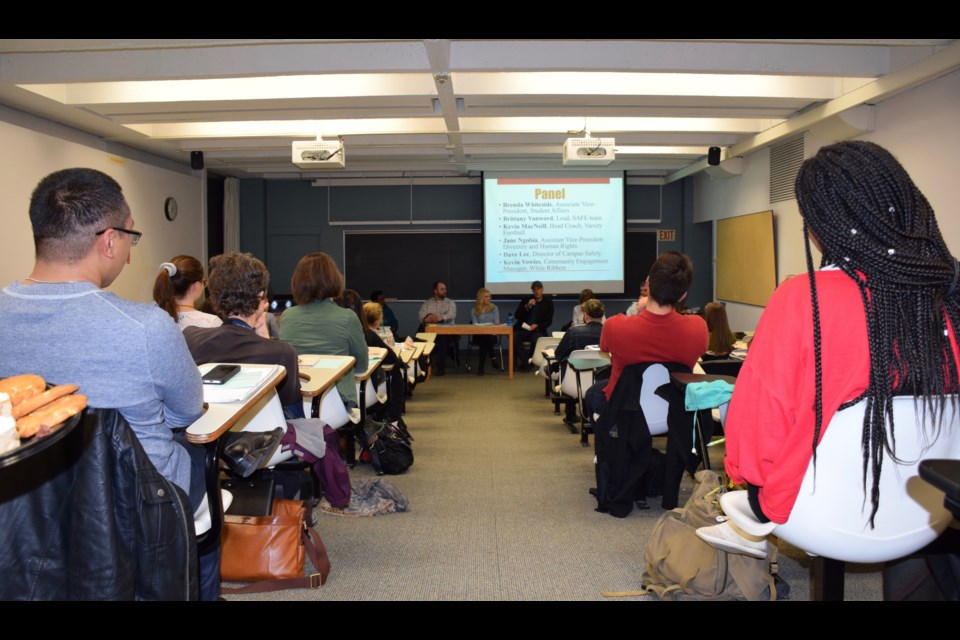The University of Guelph’s director of campus safety wants sexual violence to be the number one safety issue on campus. Dave Lee is working to ensure that people under his command know how serious the issue is, and how serious he is about addressing it.
Lee, a retired Ontario Provincial Police inspector who took a job at U of G just five months ago, said that while there may be only a small number of sexual violence reports each year on campus – two or three each year – he believes “there is a lot more going on than that.” He said he wants the issue “on the front-burner” at the university.
Lee was part of the Owning the Problem – Creating the Solution panel discussion assembled Wednesday night to discuss Ontario’s It’s Never Okay: Action Plan to Stop Sexual Violence and Harassment, a $41 million plan, backed by legislation, to build a province in which everyone is free from the threat of sexual violence and harassment, and to strengthen support for survivors.
In her opening remarks, Sly Castaldi, executive director of Guelph-Wellington Women in Crisis, said in her 25 years as an anti-violence activist she has never seen a more concerted effort on the part of a government to tackle the scourge of sexual violence.
Castaldi said for the past 45 years, rape crisis centres have been sounding the alarm about the prevalence of sexual violence in society, but not enough was ever done through strong, broad-based government legislation, policy and action to address it.
But a “perfect storm” of events over the last year, including high profile sexual violence cases, disturbing acts of sexual violence on campuses, and heightened public awareness and outrage, resulted in a tipping point in Ontario, she said.
“The government said, enough,” Castaldi said, adding she has never seen so much and such direct action taken in such a short period of time. “It is an incredibly exciting time.”
The government of Kathleen Wynne has crafted an action plan in which every workplace, campus, home, and community is to be made safer from sexual violence and harassment.
The poignant advertising campaign “Who Will You Help” reached 85 million viewers around the world. Very quickly resources were enhanced, and access to them expedited to help survivors of sexual violence.
Helplines and resources for female and male victims were enhanced, more training resources were put in place, and the action plan quickly and consistently disseminated information on how to intervene to prevent sexual violence, how to report it, and how to be ally in the fight against it. Learn more here
Lee said it is his hope that the campus community, and particularly its security personnel learn to more effectively interact with survivors of sexual violence. Too many victims shy away from reporting, and that must change.
Kevin MacNeil is interim head coach of the Gryphons football team. He said the personal development of players is just as important to him as their performance on the field. He is doing what he can to help male athletics shed the myths surrounding masculinity – that men shouldn’t show emotion, and that sexual conquest is part of being a man.
Many men do not have positive role models growing up, and those myths remain prevalent.
“There are myths that have to be deprogrammed at this level to prevent those then from being perpetuated.”
He is eager to engage with kids between the ages of 15-19 “who have gone off track” due to those masculine myths, and do what he can to help them.
“If we can be role models in the community and help change the culture on campus, that is way better than winning a Yates Cup,” he said.
Panel member Jane Ngobia, assistant vice-president of diversity and human rights on campus, said the entire campus community has to be engaged in confronting the issue sexual violence through multiple approaches.
She said that in her experience it is very heartening when male witnesses come forward to support women who have launched formal sexual violence complaints. That appears to be more common than it used to be.
And Brenda Whiteside, associate vice-president of student affairs, said addressing the issue on campus goes beyond having a stand-alone policy and reporting procedure – requirements of the government’s action plan. More importantly it requires an integrated campus-wide response and a significant culture shift.
“We need to find a way to help people understand that this is a problem,” she said. “All of us need to come together as a community to say it is an issue.”
